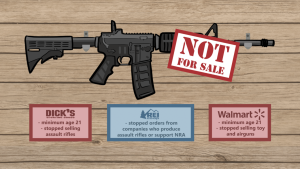Retailers take small steps to change American gun culture
March 29, 2018
Recently, Facebook has drawn fire for harvesting and selling excessive amounts of data from their customers without permission. Indeed, regulatory bodies exist to dissuade excesses of corporate action.
However, situations such as Facebook’s present a poor comparison to the actions of retailers such as Dick’s Sporting Goods or Walmart when it comes to their policies regarding the sales of firearms, such as raising the minimum purchasing age to 21 or stopping their sales altogether. Foremost, these decisions do not negatively impact their customers as a whole, unlike what Facebook has done. One could easily shop at these retailers and ignore their firearms sections completely. On a deeper level, though, this question remains: should retailers truly be criticized for their actions, however disingenuous, for the sake of profit, public relations or other goals that advance the ultimate object of a corporation: to achieve profit?
I previously posited that criticism could be directed to these retailers for weak attempts to stem the onslaught of mass shootings through changing only their own store policies and not attempting to target the root of the issue by lobbying for congressional attention. However, such efforts are time consuming and prohibitively expensive; the National Rifle Association spent over $55 million during the 2016 year on lobbying and independent campaign expenditures. It is unreasonable to expect a corporation to spend such amounts of money on a venture not core to its business.
Additionally, it may not even be legal for corporations to restrict firearms sales on the basis of age. Lawsuits are already in progress that accuse corporations of restricting an adult’s right to a firearm on the basis of the second amendment’s protection of the right to bear arms. Should it not be commended further for corporations to stick their neck out at all in an environment that may not even be receptive to their actions legally?
One aspect of the criticism directed toward these retailers is that they only account for a small portion of total firearms sales, and that they should accordingly receive less praise for their actions. However, I believe that their new policies are targeting a more abstract aspect of the mass shooting epidemic: American culture.
America has a long and storied history and relationship with guns; indeed, you could say that firearms are tied to the national spirit. This relationship carried America through its revolutionary period, and stands as a symbol to some of the protections of freedom and liberty against a potentially tyrannical government. Guns have become tied to the idea of strength and manhood for some sections of the country.
This, by itself, would not be so troubling, were it not for another issue that exacerbates the problem: mental health in America. One in five adults in America has a mental health issue, and 8.2 percent of youths have depression, of which 76 percent remain untreated. Furthermore, 56 percent of Americans with mental health issues do not have access to treatment. This epidemic, in combination with the widespread penetration of firearms into the American psyche and culture, results in situations in which those who suffer from mental health issues sometimes seek out the use of guns as an outlet for their issues.
One can look to Nicolas Cruz of the Parkland shooting as an example. Clearly, he should not have been in a position to be able to purchase a firearm, seeing as he had a history of mental health problems such as anger issues. Unfortunately he did; and he sought specifically to use firearms as a method to vent his anger.
Culture is created through social patterns established over long periods of time. In Japan, bowing to others is culture. In France, it is customary to kiss others on the cheek in greeting. In the US, the ownership of firearms is cultural; indeed, it is a rite of passage in some areas of the country to go hunting. This culture has long-standing, historical roots; but can alsoenable those with mental health issues to harm others by providing an easy avenue to harm and destroy.
Culture, however, does not change quickly. Antiquated practices and the usage of traditional, scientifically unproven medicines are still existent in an environment that is easily able to offer viable, modern alternatives. Thus, to change the gun culture of the United States would have to be a long-term initiative, only incrementally achievable.
I again return to the actions of retailers in response to the Stoneman Douglas shooting. Some may be of the opinion that those retailers received too much praise in practicing change onlywithin their own stores, and ultimately affecting little outside their own spheres of influence. However, as I would argue, isn’t that enough?
Change comes slow. Perhaps critics are right, and what these retailers have done is not enough to bring about the beginning of change. However, even if the changes to these retailers’ policies are ever-so-slight, perhaps they can herald the beginning of the beginning of change.




























































guns for sale • Aug 4, 2020 at 11:41 pm
Different activities and sports come with various advantages, and gun shooting is no different, with the vast improvement it does to your posture, stamina, muscle strength, as well as the mental effects it has on your system, it’s a small wonder why not more people are opting for this sport.